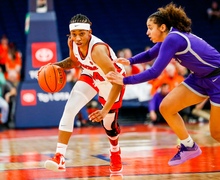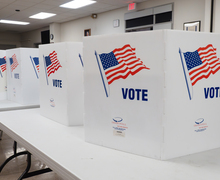And the chancellor said: Thou shall not cheat and the students obeyed
In two years, students may be required to submit essays and papers to a Web site to check for plagiarism before professors grade each assignment.
This is a possible change in Syracuse University’s academic integrity policy, one of several updates the university is currently going through.
In a recent survey conducted by the Vice Chancellor and Provost Committee on Academic Integrity, 11 percent of SU students admitted to cheating in the previous year, 53 percent of students said they wouldn’t report cheating if they saw it and more than 70 percent admitted to at least one of 20 cheating behaviors.
The VCPAI has been working since the fall of 2004 to research and survey the state of academic integrity at SU, and on July 1, 2006, the completed policy went into effect. The new plan will be uniform across the entire university.
It also created an Academic Integrity Office to coordinate the policy’s implementation, to create a database of infringements and to educate students and faculty about the policy.
The VCPAI has also suggested plagiarism-detection software, such as turnitin.com, to curtail cheating on written work. However, the plan has yet to go into effect.
This software will allow students to submit their papers to the Web site, which will check them for similarity to outside sources. The databases used include periodicals, reference materials, the Internet and many others. They also save the submitted work and check future submissions against it.
This service can be used by teachers to check all submissions, or it may be used by students to check that they have cited everything correctly.
When a student’s paper enters the database, the student’s identity is not on it. The paper’s specific writer will remain anonymous, but if another teacher receives a paper that resembles it, they can contact the teacher who submitted it.
‘It has to gel with Blackboard(.com), so we’ve had some implementation issues,’ said Elletta Sangrey Callahan, chair of the VCPAI and a professor of law and public policy.
She also said while the school considers implementing it, they need to have an open discussion with the students.
‘The best thing is the fact that there is a single policy for all,’ Callahan said. ‘Unlike 11 different polices that make it difficult, consistent implementation is more fair in every way.’
Previously, each college used a different policy for academic integrity, including different definitions of plagiarism or no definition at all.
When processing cases, some schools allowed lawyers, and some didn’t, and the systems of hearing boards varied greatly.
Also, only three schools specifically outlined faculty expectations: the School of Education, the Whitman School of Management and the College of Visual and Performing Arts.
Under the new policy, the entire university follows the same policies and procedures, and faculty expectations are clearly stated.
In addition to using material from another source without citing it, the policy forbids lying while requesting a make-up exam, making up research figures and submitting the same work in more than one class without approval from the teachers.
The policy allows that what technically is plagiarism may be an honest mistake on the student’s part.
‘When a student has attempted to acknowledge sources but has not done so fully or completely, the instructor may determine that the issue is misuse of sources or bad writing, rather than plagiarism,’ the policy states.
Another one of the policy’s best features is the Academic Integrity Office, Callahan said.
Ruth Federman Stein, currently a consultant in the Center for the Support of Teaching and Learning, will serve as the office’s interim director for a year.
Whenever a student breaks one of the policies, the initial discipline is still up to the teacher, Stein said. The student will then meet with someone in the AIO to learn how to avoid a breach of academic integrity in the future.
The teacher must submit a report, which will go into the AIO’s database, where a student’s history with academic honesty can be traced. The database covers the entire university, so if a student commits another infringement in another class, it can be accurately shown as a second offence.
Upon a second violation, the issue will go before a hearing panel made up of students and professors specifically trained by the AIO. The panel will look at what happened and decide on an appropriate course of action, which may include suspension or expulsion.
The AIO will also educate students about the policy. Mimi Mak, a senior chemistry and physics major, described the problem that this will help solve.
‘Some people don’t know they’re cheating,’ Mak said.
The AIO sent e-mails to the entire faculty and student body, answering some basic questions, and directing them to the office’s Web site, academicintegrity.syr.edu. The Web site includes the entire policy, as well as how to contact the office with concerns or problems.
‘We need to educate people about being honest,’ Stein said. ‘You’re not going to want a doctor who cheated during medical school. How can you trust someone like that?’
Each school will have an academic integrity coordinator to work with both the school and the AIO. The schools continue teaching integrity in their own ways, in addition to the uniform policy.
Jen McCaffrey, a freshmen newspaper major, attended one such session.
‘We all had to go to a session on plagiarism just for Newhouse,’ she said. The session specifically described publicized instances of plagiarism in the media, such as the Jayson Blair scandal at The New York Times.
Some students, such as Avi Hameroff, a sophomore physics major, said they feels the policy doesn’t concern them.
‘I never cheat, so personally I won’t be affected,’ Hameroff said. ‘I take pride in my work.’
Gael Sweeny, a writing professor, said she thinks the teachers also need to prevent academic dishonesty.
‘I always make my assignments specific,’ Sweeny said, ‘Because when teachers just assign an essay on Huck Finn, students can get 100 of them on the Internet.’
Published on September 25, 2006 at 12:00 pm





